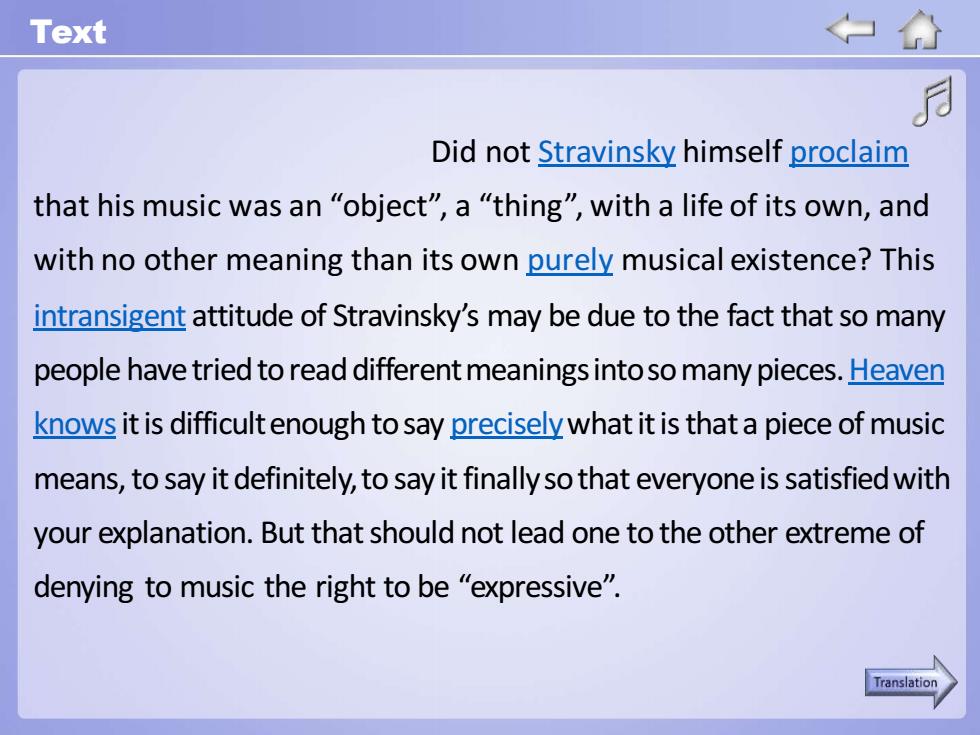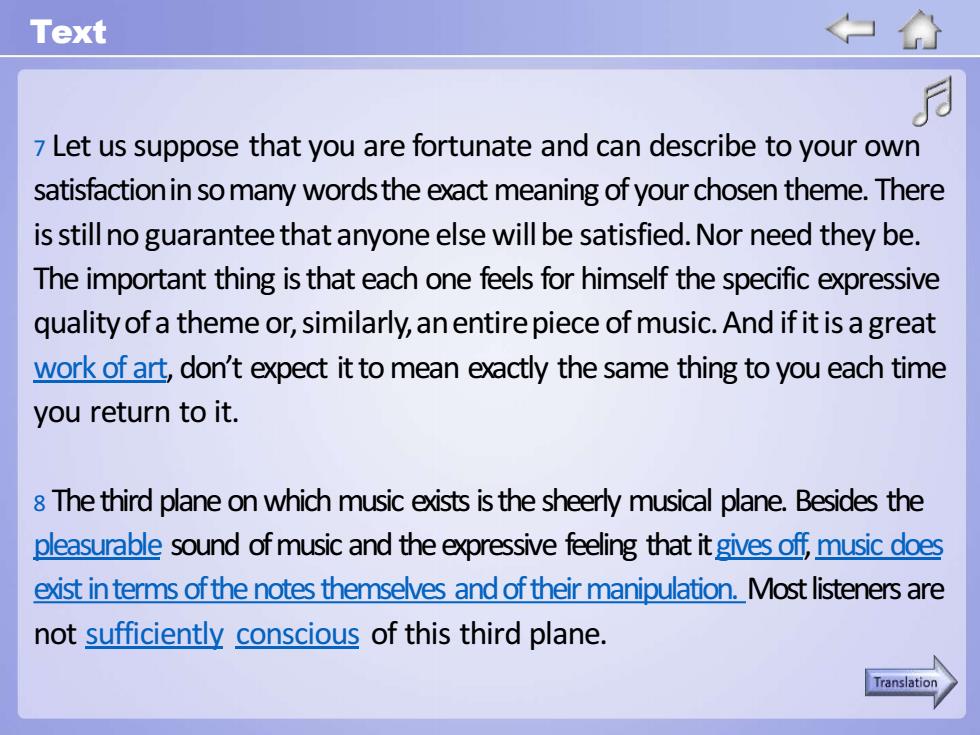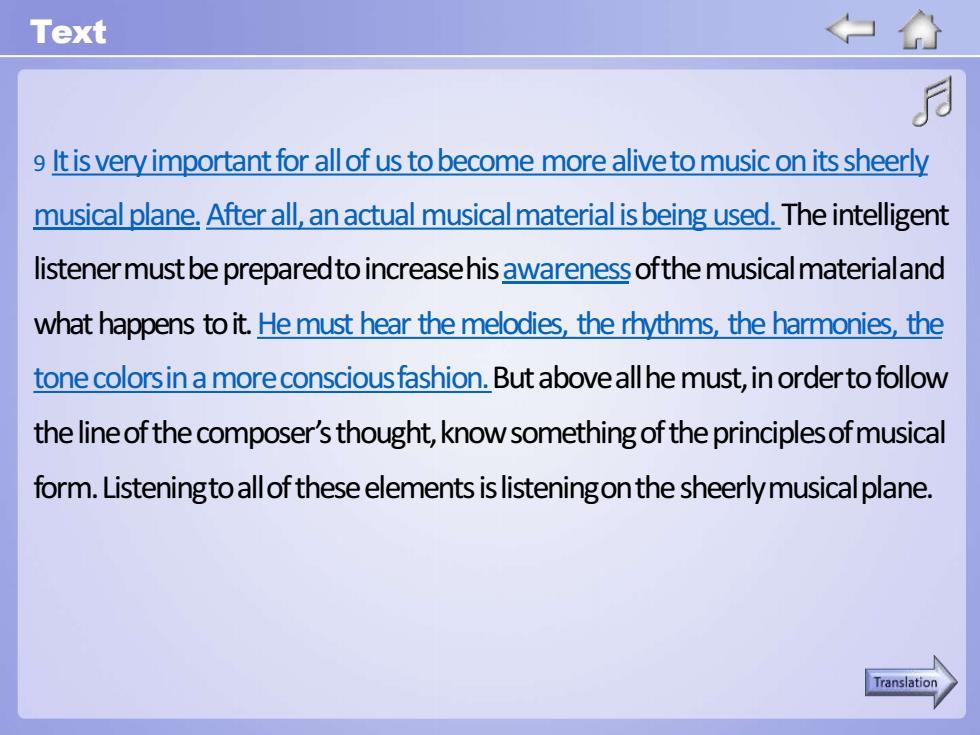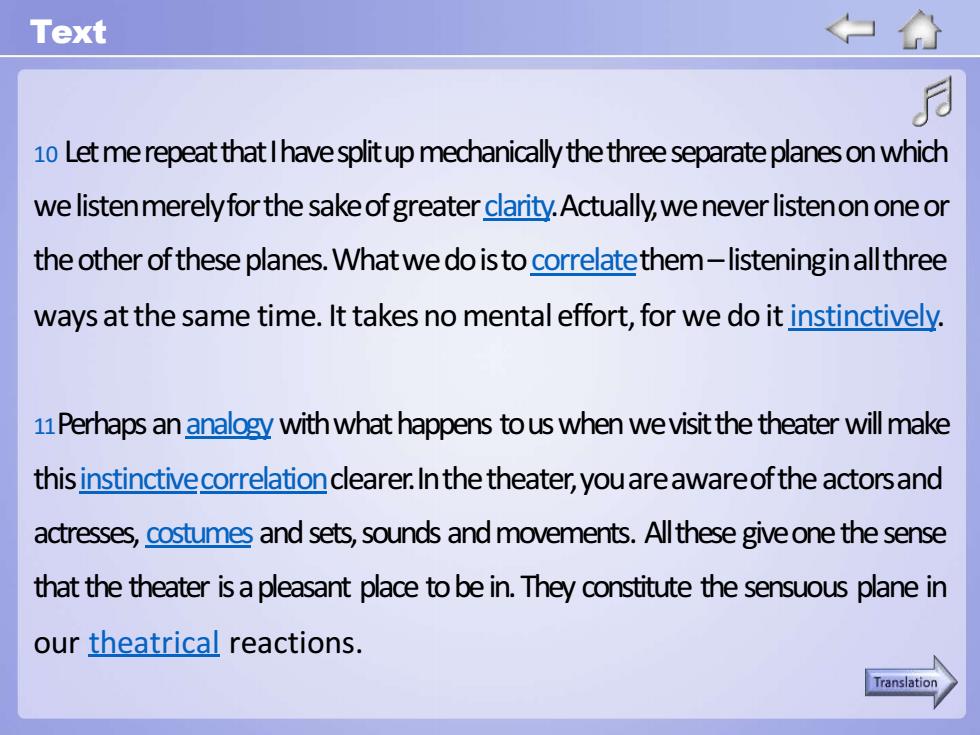
Text Did not Stravinsky himself proclaim that his music was an "object",a "thing",with a life of its own,and with no other meaning than its own purely musical existence?This intransigent attitude of Stravinsky's may be due to the fact that so many people have tried to read different meanings into so many pieces.Heaven knows it is difficult enough to say precisely what it is that a piece of music means,to say it definitely,to say it finally so that everyone is satisfied with your explanation.But that should not lead one to the other extreme of denying to music the right to be "expressive". Translation
Did not Stravinsky himself proclaim that his music was an “object”, a “thing”, with a life of its own, and with no other meaning than its own purely musical existence? This intransigent attitude of Stravinsky’s may be due to the fact that so many people have tried to read different meanings into so many pieces. Heaven knowsit is difficult enough to say preciselywhat it is that a piece of music means, to say it definitely, to say it finally so that everyone is satisfied with your explanation. But that should not lead one to the other extreme of denying to music the right to be “expressive”. Text

Text 6 Listen,if you can,to the 48 fugue themes of Bach's Well-TemperedClavichord. Listen to each theme,one after another.You will soon realize that each theme mirrors a different world of feeling.You will also soon realize that the more beautiful a theme seems to you the harder it is to find any word that will describe it to your complete satisfaction.Yes,you will certainly know whether it is a gay theme or a sad one.You will be able,in other words,in your own mind,to draw a frame of emotional feeling around your theme.Now study the sad one a little closer.Try to pin down the exact quality of its sadness.Is it pessimistically sad or resignedly sad;is it fatefully sad or smilingly sad? Translation
6 Listen, if you can, to the 48 fuguethemes of Bach’s Well-Tempered Clavichord. Listen to each theme, one after another. You will soon realize that each theme mirrors a different world of feeling. You will also soon realize that the more beautiful a theme seems to you the harder it is to find any word that will describe it to your complete satisfaction. Yes, you will certainly know whether it is a gay theme or a sad one. You will be able, in other words, in your own mind, to draw a frame of emotional feeling around your theme. Now study the sad one a little closer. Try to pin down the exact quality of its sadness. Is it pessimistically sad or resignedly sad; is it fatefully sad or smilingly sad? Text

Text 7 Let us suppose that you are fortunate and can describe to your own satisfaction in so many words the exact meaning of your chosen theme.There is still no guarantee that anyone else will be satisfied.Nor need they be. The important thing is that each one feels for himself the specific expressive quality of a theme or,similarly,an entire piece of music.And if it is a great work of art,don't expect it to mean exactly the same thing to you each time you return to it. s The third plane on which music exists is the sheerly musical plane.Besides the pleasurable sound of music and the expressive feeling that it gives off,music does exist in terms of the notes themselves and of their manipulation.Most listeners are not sufficiently conscious of this third plane. Translation
7 Let us suppose that you are fortunate and can describe to your own satisfaction in so many words the exact meaning of your chosen theme. There is still no guarantee that anyone else will be satisfied. Nor need they be. The important thing is that each one feels for himself the specific expressive quality of a theme or, similarly, an entire piece of music. And if it is a great work of art, don’t expect it to mean exactly the same thing to you each time you return to it. 8 The third plane on which music exists is the sheerly musical plane. Besides the pleasurable sound of music and the expressive feeling that it gives off, music does exist in terms of the notes themselves and of their manipulation. Most listeners are not sufficiently conscious of this third plane. Text

Text 9 It is very important for all of us to become more alive to music on its sheerly musical plane.After all,an actual musical material is being used.The intelligent listener must be preparedto increase his awareness ofthe musical materialand what happens to it.He must hear the melodies,the rhythms,the harmonies,the tone colors in a more conscious fashion.But above all he must,in order to follow the line of the composer's thought,know something of the principles of musical form.Listeningto all of these elements is listeningon the sheerly musical plane. Translation
9 It is very important for all of us to become more alive to music on its sheerly musical plane.After all, an actual musical material is being used. The intelligent listener must be prepared to increase his awarenessof the musical material and what happens to it. He must hear the melodies, the rhythms, the harmonies, the tone colors in a more conscious fashion. But above all he must, in order to follow the line of the composer’s thought, know something of the principles of musical form. Listening to all of these elements is listening on the sheerly musical plane. Text

Text 10 Let me repeat that I have splitup mechanically the three separate planes on which we listen merely for the sake of greater clarity.Actually,we never listenon one or the other of these planes.What we do is to correlate them-listening in all three ways at the same time.It takes no mental effort,for we do it instinctively. 11Perhaps an analogy with what happens to us when we visit the theater will make this instinctive correlation clearer.In the theater,you are aware of the actors and actresses,costumes and sets,sounds and movements.Allthese give one the sense that the theater is a pleasant place to be in.They constitute the sensuous plane in our theatrical reactions. Translation
10 Let me repeat that I have split up mechanically the three separate planes on which we listen merely for the sake of greater clarity. Actually, we never listen on one or the other of these planes. What we do is to correlatethem –listening in all three ways at the same time. It takes no mental effort, for we do it instinctively. 11 Perhaps an analogywith what happens to us when we visit the theater will make this instinctivecorrelationclearer. In the theater, you are aware of the actors and actresses, costumes and sets, sounds and movements. All these give one the sense that the theater is a pleasant place to be in. They constitute the sensuous plane in our theatrical reactions. Text